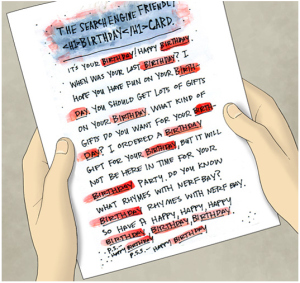 Everything has to begin somewhere. This isn’t a new agey truth, but a basic fact…without a beginning…well…there really is nothing. It sounds deep but it really isn’t. What IS deep is when you consider this fact in terms of your writing. You can call yourself a writer, you can buy a laptop, pens, notepads, a Writers Market and a box of Twinkies and feel like a writer but, if you don’t begin somewhere and actually write….you really aren’t a writer but just a guy (or gal) with a lot of cool writing crap.
Everything has to begin somewhere. This isn’t a new agey truth, but a basic fact…without a beginning…well…there really is nothing. It sounds deep but it really isn’t. What IS deep is when you consider this fact in terms of your writing. You can call yourself a writer, you can buy a laptop, pens, notepads, a Writers Market and a box of Twinkies and feel like a writer but, if you don’t begin somewhere and actually write….you really aren’t a writer but just a guy (or gal) with a lot of cool writing crap.
So where does one begin? Is there some secret handshake that all new writers have to learn before they proceed? No, not really…(although if you have a writer’s group a cool handshake might be kind of fun…) the only thing new writers have to do is begin and as easy as that sounds I do realize that it can be daunting. In fact, shhhh…don’t tell anyone but, it can be kind of daunting for those of us old geezer writers too. In fact, beginning can be tough every single time you begin a new project. There are, however, some basic steps that you can follow that will make that jump off the starting line a little easier. I have developed six steps for myself that I have posted in my office for times when my brain will not connect to my hands which will then not connect to the keyboard. I’m gonna share them with you and hopefully they may help…even if you use them to develop your own six steps.
Step 1: Set the Foundation
Let’s face it; you can’t build just about anything without a foundation. Build a house without one and it will fall, build a Lego castle without one and it will fall, build a sandwich without one and it will be a mess…build your story without one and you will come off to readers like a guy wandering in the desert. You have to lay that foundation whether it is deciding where your story is going to take place, who your story is about or how it may end…if all begins with that first layer.
Step 2: Defining Your Story
Is it a mystery, a thriller, a romance, a multi-genre piece? You have to decide what kind of story you are pursuing. I know, there are writers out there who will say, “I don’t know what kind of story I’m writing until I’m way into it”, B.S., you have to know the basics or you will have no idea what kind of characters you are creating. You have to have a basic idea of the overall concept of your story. (This, of course, goes without saying for non-fiction writers)
Step 3: Creating a Strong Leader
After you’ve set the foundation (you are here) and defined your story (you are scared, lonely, in love…whatever) you must create your leader. There is a reason why in movies we always see the aliens say, “take me to your leader”, because the leader is supposed to be the guy who knows what is what. He/she is the go to person for your story…it is, after all, all about his/her struggles, triumphs and victories. Start every story with a strong lead character whether they are good or evil.
Step 4: Overcoming the Jitters
It is at this point that a lot of writers look at themselves in the bottom of their brandy glass and say…crap, maybe I have no right to do this. Self-doubt almost always sets in somewhere between having the basics done and stepping off that cliff into actual writing time. It’s normal and we all go through it…don’t let anyone tell you different. The difference between being a writer at this point and the guy with the cool writers stuff is whether or not you put down that glass of (choose your poison and insert here) and push forward. It isn’t always easy but it has to be done. Suck it up Buttercup and jump…your characters will catch you.
Step 5: The Mindset of the Writer
Writing is a state of mind as much as it is a thing you do. Sure you have the words and the cool tools but if you aren’t a writer in your own mind it’s time to hang up your socks with the toes in them and go watch “Charmed” reruns. You have to arrive at the desk every day as a writer who knows that he/she is a writer. There is a lot of new agey crap floating around about thoughts and what your own thoughts can do to you or for you…it’s one of the few new agey things that I subscribe to…if you believe you are a writer and actually write, you are, it doesn’t matter who else agrees. You have to bring that self to the table though.
Step 6: Taking Daily Action
Finally, the most important step is the last…taking action every single day. You can say you are a writer but if you don’t actually write it is over before it even begins. You have to begin…and then you have to (History nerd alert – Napoleon reference) march on like a short guy conquering a country; nothing can deter you not even short jokes.
So these are my 6 steps, you can use them or create your own but I firmly believe that if you set the tone by giving yourself a personal path to follow to the keyboard you won’t end up in the kitchen standing in front of the frig scratching your behind looking for that leftover fried chicken from the night before. Foundation – Definition – Creating – Overcoming – Mindset – Action, it’s easy. Now…get to it…..
© The Writer’s Advice, 2012. Unauthorized use and/or duplication of this material without express and written permission from this blog’s author and/or owner is strictly prohibited.
Like this:
Like Loading...





